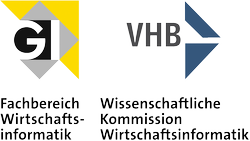Track 10: Forschungsmethoden und Wissenschaftstheorie
Due to its strong interrelations with disciplines as diverse as management, computer science, psychology, and others, Information Systems research today is characterized by manifold paradigmatic views and methodological approaches. The IS field has a long history of discussing its research methods and different schools of thought compete for attention and legitimacy. Prominent examples include the positivist and the constructivist paradigm, each based on their own epistemological assumptions and accompanied by sets of criteria for conducting methodologically sound research. In recent years, it was particularly the design research paradigm which has attracted the interest of IS researchers worldwide. Whether it is acknowledged or not, the philosophical premises underlying any form of scientific investigation come with fundamental consequences for the practice of IS research and its results. Not least, the interplay between philosophy of science, the choice and employment of different methods, and the very nature of our research results is reflected by the perpetual debate on the trade-off between rigor and relevance in IS. A discussion of research methodologies and their philosophical foundations is hence crucial for the future of the field as whole.
Against this backdrop, the purpose of the present track is to consider the role of philosophy and methodology in the IS discipline in a broader context. Our objective is to provide a platform for researchers who seek to investigate and critically evaluate the boundaries of current paradigms and the associated methods used in IS research. We do not only welcome contributions which explore the functional adequacy and internal consistency of specific methods, but also the equally critical aspects of practical impact, ethical limitations, and societal implications. We also appreciate papers that are aimed at investigating the organization of scientific collaboration and the dissemination of research results.
Topics
Quantitative research methods
Qualitative research methods
Design science / Design research
Pluralistic research methods
Methods & techniques for the choice of research methods
Philosophical positions and assumptions
Epistemological aspects of IS research
Theory development in IS research
Managerial relevance vs. generalizability
Paradigms and methodologies for emerging issues (e.g. social networks, Green IS, cloud computing)
Ethical implications
Interaction with other disciplines / IS as a reference discipline
Software tools for research
Evaluation of research
Innovative patterns of scientific collaboration
Innovative patterns of exchange / collaboration with practitioners
Approaches to teaching research methods
Future challenges of IS research
Track Chairs
Prof. Dr. Ulrich Frank, Universität Duisburg-Essen, Deutschland
Prof. Dr. Frédéric Thiesse, Universität Würzburg, Deutschland
Programmkomitee
Prof. Dr. Roman Beck, Universität Frankfurt, Deutschland
PD Dr. Peter Fettke, Universität Saarbrücken, Deutschland
Prof. Dr. Stefan Klein, Universität Münster, Deutschland
Prof. Dr. Franz Lehner, Universität Passau, Deutschland
PD Dr. Dr. Björn Niehaves, Universität Münster, Deutschland
Prof. Mag. Dr. René Riedl, Universität Linz, Österreich
Dr. Kai Riemer, University of Sydney, Australien
Prof. Dr. Bernd Carsten Stahl, De Montfort University, Großbritannien
Prof. Dr. Stefan Strecker, FernUniversität Hagen, Deutschland
Prof. Dr. Volker Wulf, Universität Siegen, Deutschland














